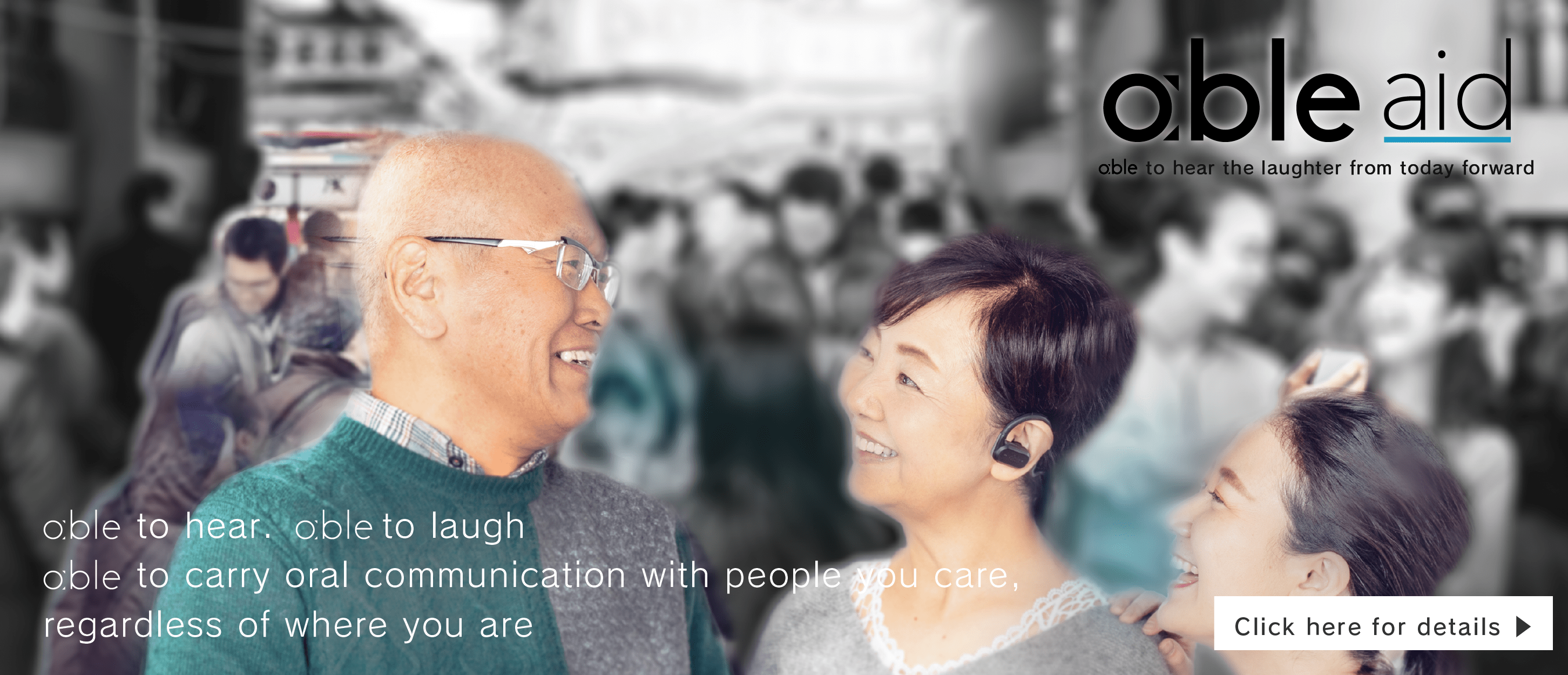
Is that a hearing aid you're wearing? A sound collector?
Many people think of hearing loss as problems for elderly people only.
In fact, it is known that hearing loss could start as early as in the 20s or 30s.
The World Health Organization(WHO) announced in March 2020 that 466 million people, about 5 percent of the world's population, suffer from hearing loss due to low body weight at time of birth, loud noise and aging.That number is expected to reach over 900 million people by 2050.
Hearing loss can not only negatively impact children's ability to learn their native language and their academic performance, but also significantly impact the lives of adults whose personal life and work are affected and the elderly who may feel reluctant to step outside from hearing difficulties. While hearing loss progresses slowly and is unlikely to exhibit subjective symptoms, The Oto-Rhino-Laryngological Society of Japan has announced that hearing aids can be used to improve the quality of life.

Author:Riyo Aomoto
Global Writer
Index
Difference between hearing aids and PSAPS
According to a report released by the Japan Hearing Instruments Manufacturers Association in 2018, the number of people with self-reported hearing loss is about 13.2% of the population aged 18 or more.
Despite the fact that 89% of people who own hearing aids have various positive effects such as ease of conversation and security, the number of people who actually own hearing aids is as low as 14.4%. It means that many people do not use hearing aids despite their hearing difficulties.
"I think I have a slight hearing problem but hearing aids are for grandparents. I'm young so I still have time.”
For people with relatively mild hearing loss, purchasing a hearing aid will be met with a high psychological hurdle. In addition, the high cost of hearing aids imposes a heavy burden on those with need from an economic standpoint.
In contrast, PSAPS offer a more affordable solution to hearing loss.
Both hearing aids and PSAPS are devices that amplify sounds by being placed in or over the ear canal and improve hearing.
I will briefly explain how PSAPS are different from hearing aids.
First, hearing aids are medical devices authorized under the Pharmaceutical Affairs Law under the purview of the Ministry of Health, Labor and Welfare.There is no consumption tax on hearing aids.
According to Aigan STYLE operated by Aigan Co., Ltd., hearing aids tend to be more expensive as they become smaller. Generally, if you choose " in the ear type", it costs around 200,000 yen per unit, and about 400,000 yen for both ears.
Permission is required to manufacture and sell and you must list your license number upon sales. Also, in order to purchase, actual fitting and adjustment are required.
PSAPS are irrelevant to the Pharmaceutical Affairs Law and are subject to consumption taxes. These are less expensive than hearing aids, and can be easily purposed at retail shops or online.
PSAPS are expanding its market share globally. According to this statistic released by Global Market Insight in January 2020, its market size as of 2019 is US$68 million.It has been announced that the annual average growth rate of 5.2% is expected from 2020 to 2026.
Growing use of OCT hearing aids(PSAPS)in the US
PSAPS may be inexpensive, but its level of technology is increasing year by year.
Let’s take the example of the US, a country considered to be leading the development of hearing aids. On August 19 of 2017, the US congress passed a legislation related to hearing aids and PSAPS, which was subsequently signed by President Trump.
The legislation is called the FDA Reauthorization Act of 2017.
The Over the Counter Hearing Aid Act, an act included in the 2017 legislation and one which will be enacted in 2020, facilitates access to safer and higher-grade hearing aids and PSAPS for people with light-to-medium hearing difficulty.
According to the US Institute for The National Institute on Deafness and Other Communication Disorders, about 15 percent of Americans aged 18 or above feel auditory discomfort. Similarly, this research reports that out of those with hearing problems between the ages of 20 and 69, the ratio of people who possess hearing aids remains at 16 percent.
Until now, in the US, only clinics and facilities authorized by the Food and Drug Administration or FDA, a government agency with similar roles as the Ministry of Health, Labor and Welfare of Japan, were able to sell hearing aids under the guidance of experts. For people with hearing problems of light-to-medium degree to acquire hearing aids in the US, a country without universal healthcare, the need to undergo examinations, the high cost of hearing aids and the lengthy process were the biggest hurdles.
On the other hand, PSAPS were sold not as medical devices but as electronic devices in the country, and while they were more accessible to people with hearing difficulties, their price range and quality were widely varied.
The aforementioned new legislation, the Over the Counter Hearing Aid Act, sets a new category called OTC(Over-the-Counter)hearing aids, which covers hearing support devices that are both reasonably priced and available for a quick purchase.
Under the new act, the FDA is drafting its guidelines.
With the advent of this new category, the borderline that separated hearing aids and PSAPS becomes obscure, enabling hearing aids and PSAPS to be purchased as OTC Hearing Aids that are regulated under FDA rules and regulations, that are thus safe and of high quality and without the need to ask for experts’ help.
There are speculations that opening the market under the new act would bring about fall in prices of hearing aids.
This may make it easier for people with light-to-medium hearing difficulties to purchase high-grade PSAPS at reasonable prices, and may even allow people with more serious hearing problems to purchase hearing aids at a lower cost.
Why you should choose PSAPS over traditional hearing aids
It is known that hearing loss can be associated with cognitive decline. When your hearing is damaged, it is important to get support at an early stage.
Even if people feel they don’t need to get hearing aids at this moment, if the affordable, high-quality PSASPS are available, they might like to try them.
When you have difficulties hearing others in noisy environments, you can reduce the frustration with the help of PSAPS which allows you to focus on the speaker. High quality, multi-function PSAPS can help relieve your stress and frustration from hearing problems.
Author’s note
We tend not to care enough for our ears while we use them too much with daily phone meetings, listening to music on earphones.
Even though you think it is a small thing, people might feel it is difficult to communicate with you because of the hearing issue.
It is easy to forget that these small things can have a great impact on social life.
If you have medium hearing loss but believe getting hearing aids/PSAPS are too much, it might cause more severe damage.
Age related hearing loss comes on gradually as a person gets older. I hope negative stigmas for hearing aids and PSAPS are ended so that we all can improve our own well-being.
References
WHO, “ Deafness and hearing loss ”, Visited on March 1, 2020
The Oto-Rhino-Laryngological Society of Japan, "About hearing loss",The Oto-Rhino-Laryngological Society of Japan, Visited on August 5, 2020
The Japan Hearing Instruments Manufacturers Association, “Japan Track 2018", 2018
Aigan STYLE, "How to choose a hearing aid that won't fail & the reason for the price", Visited on 7 August, 2020
Global Market Insights, “Industry Trends”, July 2020
The national institute of deafness and other communication disorder, “Hearing loss and older adults”, 17 July, 2018
The national institute of deafness and other communication disorder, “Use of Hearing Aids by Adults with Hearing Loss”, 30 September 2014
The national institute of deafness and other communication disorder, “Over the Counter Hearing Aids”, 23 March
Author of this article

Riyo Aomoto
Global Writer
She spent four years covering the U.S. economy for the U.S. bureau of a Japanese news agency, writing and translating articles.
Based on the latest articles and papers on the U.S. economy, she provides a global perspective on Japan's hearing loss and the current state of hearing aids and sound collectors.
Products considered by the authors and readers of this article


